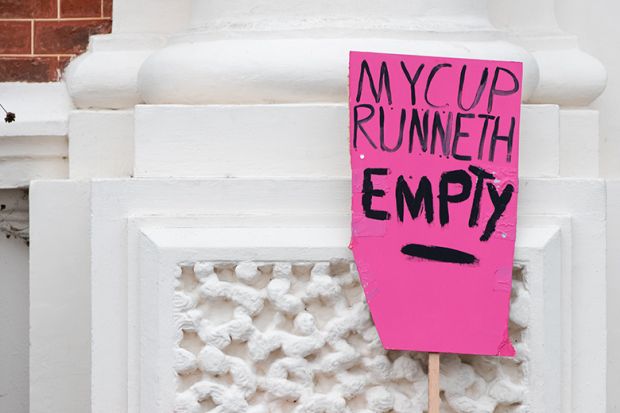The UK’s main higher education union has warned of “sustained” industrial action starting next month, including strikes and a possible marking boycott, as long-running disputes over pensions, pay and working conditions remain unresolved.
The University and College Union said that its higher education committee had authorised “coordinated UK-wide and regional rolling strikes” at 68 institutions, with specific dates starting in February due to be confirmed shortly.
The committee also “agreed to begin preparations for a UK-wide marking and assessment boycott”, the union said, a step that would significantly increase the impact of industrial action on students’ academic progress.
This comes after a further 10 institutions voted to join the 58 institutions where members spent three days on the picket lines last month, with results of the reballots announced earlier this week.
But it also comes amid apparent divisions within the union over how best to pursue the disputes, with low turnouts in the initial vote and the reballots seen by many as a sign of continuing fatigue among members from the pandemic and years of industrial disputes, and concern over the impact on undergraduates who have seen their on-campus learning significantly interrupted.
An online post by the UCU Left faction claims that “totally different types of action” were likely to be pursued in relation to the two disputes – one on pensions provided under the Universities Superannuation Scheme (USS) and the other on last year’s pay offer and working conditions.
“The wording of the decisions leaves considerable uncertainty as to the details of the action in both cases and how this would be finalised,” the blog says, adding that UCU Left supporters on the higher education committee were “very concerned and angry about this outcome”.
The latest round of the pensions dispute focuses on Universities UK’s plan to reduce the benefits provided by the USS in a bid to stave off increases in contributions that it describes as unaffordable.
The UCU has estimated that the reforms could cut employees’ guaranteed benefits by as much as 35 per cent, costing members thousands of pounds annually in retirement, but UUK’s figures suggest that the reduction is between 10 per cent and 18 per cent.
At the heart of the pay dispute was employers’ offer of a 1.5 per cent minimum rise for 2021-22, with unions demanding a £2,500 uplift instead, as well as action on inequality, casualisation and workload issues.
Jo Grady, the UCU’s general secretary, said that time was “running out” for vice-chancellors to avoid more disruption, with the marking boycott also on the cards.
“We do not take this action lightly, but university staff are tired of falling pay, cuts to pensions, unsafe workloads and the rampant use of insecure contracts,” Dr Grady said.
“We hope vice-chancellors finally see sense and address the longstanding concerns of staff. If they don’t, any disruption will be entirely their fault.”
Raj Jethwa, chief executive of the Universities and Colleges Employers Association, highlighted that only a quarter of branches reached the legal threshold for industrial action in the UCU’s most recent ballot.
“In terms of staff participation and teaching lost, the impact of industrial action so far has been fairly low in most HEIs, and below the levels seen in the 2019 dispute. Rather than threatening further disruption, UCU should engage constructively in this year’s (2022-23) multi-employer negotiating round which is planned to begin at the end of March,” he said.
Register to continue
Why register?
- Registration is free and only takes a moment
- Once registered, you can read 3 articles a month
- Sign up for our newsletter
Subscribe
Or subscribe for unlimited access to:
- Unlimited access to news, views, insights & reviews
- Digital editions
- Digital access to THE’s university and college rankings analysis
Already registered or a current subscriber? Login







